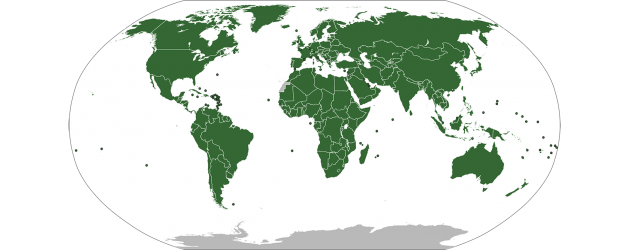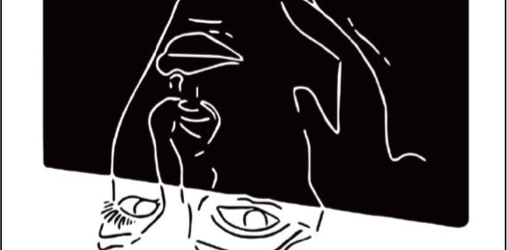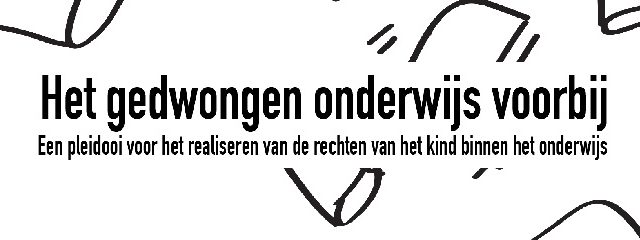
Zelfgestuurde Ontwikkeling en het VN verdrag van de rechten van het kind: Leren als ‘Plicht’
Het verdrag van de Verenigde Naties inzake de rechten van het kind, verankert het recht van kinderen op onderwijs dat kindvriendelijk is, ze zeggenschap geeft en dat mogelijk maakt dat kinderen alle mensenrechten genieten. Toch maakt het verdrag onderwijs ook ‘verplicht’. Is dit niet tegenstrijdig?
 Origineel van Je’anna L. Clements gepost op 15 oktober 2017 op de website van de Alliance for Self-Directed Education. Je’anne is een kinderrechten veteraan en een ‘unschooling’ moeder. Ze is auteur van het e-book, Help! My Kids Hate School, en het e-book dat binnenkort uitkomt, The Child’s Right to Education’. Ze is oprichter en vrijwilliger op van ‘Riverstone Village’, de eerste Sudburyschool in Zuid-Afrika. Help haar door haar op Patreon te ondersteunen.
Origineel van Je’anna L. Clements gepost op 15 oktober 2017 op de website van de Alliance for Self-Directed Education. Je’anne is een kinderrechten veteraan en een ‘unschooling’ moeder. Ze is auteur van het e-book, Help! My Kids Hate School, en het e-book dat binnenkort uitkomt, The Child’s Right to Education’. Ze is oprichter en vrijwilliger op van ‘Riverstone Village’, de eerste Sudburyschool in Zuid-Afrika. Help haar door haar op Patreon te ondersteunen.
Het verdrag van de Verenigde Naties inzake de rechten van het kind begint de beschrijving van het recht op onderwijs van het kind met de volgende woorden:
“(1) De Staten die partij zijn, erkennen het recht van het kind op onderwijs, en teneinde dit recht geleidelijk en op basis van gelijke kansen te verwezenlijken, verbinden zij zich er met name toe:
a. primair onderwijs verplicht te stellen en voor iedereen gratis beschikbaar te stellen;” (artikel 28, verdrag van de Verenigden Naties inzake de rechten van het kind, VN algemene vergadering, 1989).
Het is gemakkelijk om je voor te stellen hoe deze formulering tot stand is gekomen. Dit is een combinatie van drie zeer verschillende agenda’s.

The Hell of Compulsory Education: “Education from the Bottom Up”
Early 2018, a class at the Berlage Lyceum in Amsterdam published the book “Education from the bottom up[1]”. This class was doing their last school year before the final exams in the 6th year. These final exams provide access to University. The students experienced their education as insane, meaningless and a waste of time. This seems a clear signal that something is really wrong in our schools and the education system at large. This is a signal from young people whose voices are never listened to in education. The powerful message of this book is that this signal does not come from a ‘problem’ school or from ‘problem‘ students. The Berlage Lyceum has a reputation of being a successful school and the students who wrote the book have finished their final exams this year. “Education from the bottom up” provides a unique opportunity to listen to these students. To structure their book, they choose quotes from the report “Our Education2032[2]” written by a government commission tasked to develop the curriculum for 2032. They compared these quotes with what they saw actually happening at their school. A quote:
‘Key competences that students need to be able to function in society. The core curriculum covers the learning objectives for language, maths, digital literacy and citizenship’
So what is happening at school concerning languages? English and Dutch are not much of a problem. In most cases the school objectives are met, but what about German or French?
Most students hardly speak these languages after secondary school. Eline Peek states that this is caused by the fact that most students think they will not need these languages after school. She writes that this does not pose a problem at school, because even with only flimsy mastering French, it is possible to pass the final exams. In her words: “The problem of the education system is that it only focuses on exams…..”
So what about gymnastics? Quote:
‘Schools implement physical exercise and learning about health aspects in their own ways’
Many students become insecure of the physical exercise lessons and sporty students are not challenged. Cato Hendriks writes: “A waste of time, because we do nothing.. Schools want to stimulate physical exercise, but the current approach misses the point. Next to that, gymnastics is not stimulating for students, because the exercises are marked.
Marks are not only used for gymnastics, testing for marks is all over the place. Quote:
‘It is important that students experience testing as a way of learning. In that sense testing has a formative function’
How well is this ‘formative function’ achieved? Do tests stimulate learning or is the objective of learning to pass tests? Sterre de Jong Luneau en Summer Carroll show that testing does not give a good view of learning progress. They state that a lot of ‘studying’ happens to pass the tests, but that nothing is learned: “Students like us learn for a short term and mostly for a grade, and subsequently we forget all knowledge we acquired” They show that in the current educational model nothing is really learned from tests and that it is only about achieving good grades. Grades determine whether students can pass on to a next year. Testing is about control, not about learning. They conclude: “In order to support students, testing should be done differently or totally abolished”.
How do students view all the hours they spend in lessons? Christina Abaskharoun states that she needs to get used to every new school week with 7-8 hours of lessons, every day again. She writes that she cannot concentrate the entire school day; “Acquiring knowledge from early morning until late in the afternoon in the same building is too long in my view. This needs to change”. She wants to give students much more say in how they spend their days at school. Yannis van den Elshout has the opinion that time during lessons is often used inefficiently. Shorter school days are more efficient, both for the students and for the teachers. He states: “I do experience my lessons as senseless, meaningless and useless”. He notices that concentration of students is often low, because they are forced to process information all day long. Our Education 2032 states that next to a fixed curriculum, much room must be available for a varied educational offer, which fits the developmental stages of the students. This varied offer is something he really misses at his secondary school: “The schooldays are too long and there is hardly or no offer to expand or deepen knowledge or to built competences outside the school curriculum”.
Jasmijn Blom en Lois Owusu Mensah observe that students quite often do not know what the purpose of their schooling is. They only go to school because they are forced. They question what the government’s main objective is for schooling and whether students do agree with those objectives. They also call for more participation and freedom for students: “The government must talk to students, and when they do, they must really use the opinions of students when they shape education. Listen to the students, give them an objective, so that they do not go to school thinking it is a waste of time. If the government wants that children develop their talents: give them space, because students do not experience any.”
Our Education 2032 also sees self-direction as very important in preparing for society. Quote:
‘Citizens are increasingly dependent on themselves when it comes to how they can organize and give meaning to their lives. This appeals to their ability to make responsible choices and to set their own course. A lot of self-management will also be expected from them in their work and as a citizen.’
Sarah Luijting wonders what self-direction should look like: “So pupils have to be responsible themselves about what and how much they learn?” Then she concludes that this is not so much the case yet: “Students are punished if they do not follow the exact schedule of the teacher. They have to stay outside hours if they have not done their homework and they are shouted at if they do not pay attention in class”.
What role do teachers play in learning at school? Sara Duisters is quite clear about this after six years of secondary school. She concludes: “that the manner of teaching is one of the biggest problems. Many teachers possess a large amount of academic knowledge, but they do not know how to inspire their students”. Wolf Gerrits sees as the best solution much less lessons and much more freedom for students: “Because teachers do not add much, you spend twice as much time on something you could have learned easier. To get good grades, the help of teachers is not necessary. Over the past five years, I have learned most by myself, without the help of teachers”.
Freedom and autonomy for students are recurring themes and the lack of these leads to demotivation. Teun Hennink: “I am now attending secondary school with a fairly low motivation and I am pretty sure that I am not the only student who is confronted with this problem”. Elise van ‘t Hof reluctantly goes to school every day and comes home tired. “I go to school because I am forced. (….) Every day there is a large group of pupils who reluctantly go to school. They lack motivation. Her conclusion: “The student needs to get enough autonomy, so that motivation is promoted and as a result better performance is achieved. Autonomy means being independent, determining what you do yourself.”
Freek van der Heide knows where the lack of autonomy comes from. He describes compulsory education as hell, and describes his school as follows: “Five days a week, on average seven hours a day to school. Day in, day out. From your fourth to your eighteenth. Penalties for late arrival, compulsory courses, uninteresting and totally overworked teachers. In the year 2017 this is what education looks like. If you stay for a while in an average secondary school class and in no time the inevitable feeling that you have arrived in a totalitarian prison camp full of uninterested detainees is hammered in your brain in no time. Compulsory education was invented in the Netherlands in 1901 to remove a lot of young labourers from factory conditions, just after the big industrial revolution. In the current days it is exactly this compulsion that makes school such an incredibly uninteresting mess. The consequences are abhorrent; total boredom and disinterest in education. I experience it on a daily basis. Sleeping in class, not paying attention, rebelling against the teachers or smoking a joint before the lessons commence. There are very few students who are focussed on schoolwork for a whole day. The system does not work. Students want nothing more than to be at home and be free.. There is hardly any intrinsic motivation. (..) The government forces millions of children into something that they have a huge aversion to. It is a kind of penal servitude to force you to ‘develop yourself’. All those wasted hours that students are forced to serve at school in which they do nothing at all. (..) The compulsory education law is a law that discredits the freedom and happiness of an incredible number of people. It is a law that works very demotivating. (..) If you abolish compulsory education, developing yourself will again be a choice based on intrinsic motivation”.
Human Rights
The Universal Declaration of Human Rights was ratified in 1948. This declaration applies to all people, and thus also includes students at schools. The UN even think that people under the age of 18 are so important that in 1992 they even made a separate treaty for them, the Convention on the Rights of the Child. In this convention the human rights for children are further elaborated, such as the right to life and development, the right to participation and the right to be heard, freedom of thought, protection against abuse, the right to set up a school according to their own views, the right to rest, free time and to play and be protected against child labour.
The examples of the Berlage Lyceum show that education may not have been very good in upholding many of these human rights. The question is even whether education does not harm the future of these students and not just their future, schools can also violate the lives of pupils during or after school hours. Ines Maiguashca Sorensen shows what the shear amount of schoolwork and homework she needs to do to pass the tests does to her. The school demands a lot of her time and energy and this causes her great stress: “I always have the feeling that I am never finished. I can never rest normally and properly because I always have the feeling that there is something else I have to do. By never being able to relax, I am constantly stressed and this affects the rest of my life and my attitude towards my family and friends. It even affects my interests, for what I should be motivated intrinsically, but because of school I do not get to it. (..) I am surviving from week to week”.
These are all examples of major negative impact on the development and well being of students at their school. For many students this goes on day in and day out. I would like to ask every parent, teacher, school administrator, civil servant and member of Parliament to take action to realise human rights within school.
[1] Onderwijs van Onderen (translated to ‘Education from the Bottom Up’), 5 VWO Filosofie Berlage Lyceum, (2017) ISVW Uitgevers, Leusden
[2] ‘Ons onderwijs2023’ (translate to ‘Our Education2032’), final advice, Januari 2016, Platform onderwijs2032

De hel van de leerplicht: “Onderwijs van onderen”
Recent is het boek ‘Onderwijs van Onderen[1]’ uitgekomen van een 5 vwo klas van het Berlage Lyceum in Amsterdam. Ze ervaren veel van hun onderwijs als zinloos, betekenisloos en zonde van de tijd. In mijn ogen een duidelijk signaal dat er iets mis is met ons onderwijssysteem. Een signaal van jonge mensen naar wiens stem er binnen het onderwijs nooit wordt geluisterd. Het krachtige van dit boek vind ik is dat dit niet gaat over een ‘probleem’ school of ‘probleem’ leerlingen. Het Berlage Lyceum staat bekend als een succesvolle school en de leerlingen die het geschreven hebben doen dit jaar eindexamen. ‘Onderwijs van Onderen’ biedt een kans om wèl naar de leerlingen te luisteren.

5 mei en de vrijheid van kinderen
Op 5 mei vieren we de vrijheid die zo hard is bevochten in de Tweede Wereldoorlog. De meeste mensen vinden vrijheid belangrijk en weten ook waarom ze dit belangrijk vinden. Vrijheid is nu eenmaal een groot goed. Vrijheid is een voorwaarde om volwaardig mens te kunnen zijn. Vrije mensen kunnen zelf bepalen hoe ze hun leven inrichten en kunnen zelf keuzes maken. De rechtsstaat is er om de vrijheid te beschermen, vooral tegen de overheid.
Na de verschrikkingen van de Tweede Wereldoorlog wilden veel landen op internationaal niveau verdragen sluiten om herhaling onmogelijk te maken. Dit heeft geleid tot oprichting van de Verenigde Naties en in 1948 tot het Verdrag van de Universele Rechten van de Mens en een aantal nadere verdragen[1]. In 1992 is het verdrag van de Rechten van het Kind erbij gekomen[2].